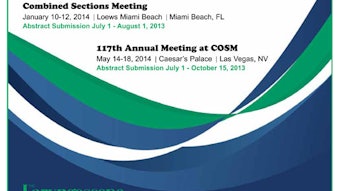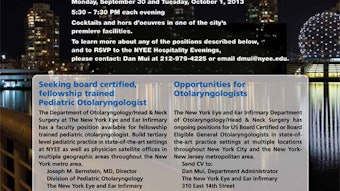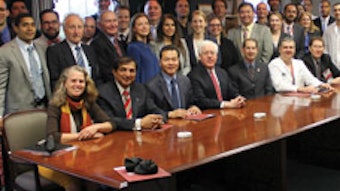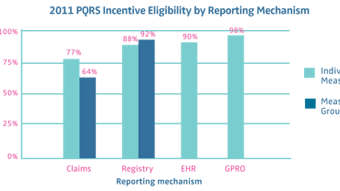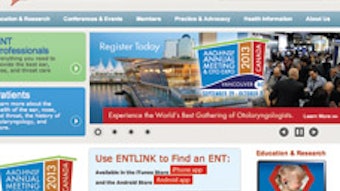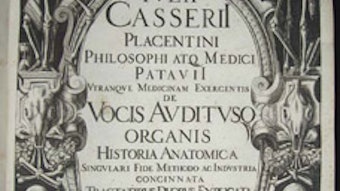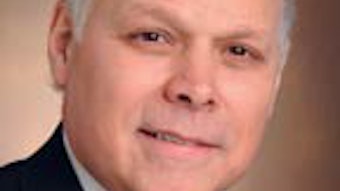Highlights from the PSQI Committee 2013
The Patient Safety Quality Improvement Committee (PSQI) has been involved in several prominent projects that have elevated our visibility despite the small size of our specialty. We received positive feedback on our quality focus and the work we have done throughout the years from officials at Centers for Medicare & Medicaid Services (CMS) including Patrick Conway, MD, chief medical officer, who congratulated us for the numerous quality improvement initiatives in otolaryngology-head and neck surgery. In addition, we were publically recognized as a joint American Medical Association/CMS meeting by Nancy Nielsen, MD, senior advisor for stakeholder engagement at the Department of Health and Human Services (HHS), for our work nationally and internationally on clinical practice guidelines and our participation as the first surgical specialty in the Choosing Wisely® campaign. There is ongoing work by PSQI on behalf of the specialty including issues affecting safety of patients, representing the specialty at national quality organizations, developing survey and database studies to identify issues for improvement in safety, and publishing studies in peer reviewed journals. During the past year, PSQI focused on the following projects, and a few of these are highlighted in more detail below. Choosing Wisely campaign FDA alert on utilization of codeine post tonsillectomy Annual meeting programming Publications Safety Web portal National quality organization representation Choosing Wisely® Campaign In the spring of 2012, we were made aware of the Choosing Wisely campaign through some of our members. Choosing Wisely was gaining momentum since the release of the lists of the initial group of organizations during phase one of the campaign in February 2012. PSQI volunteered to spearhead AAO-HNSF’s efforts in compiling a list of five treatments and/or procedures that should be questioned. The Committee reached out to academy committees, the Specialty Society Advisory Council (SSAC), and the Guidelines Task Force (GTF), so this was an inclusive process. Our list of recommendations was carefully selected after a review of the current evidence including AAO-HNSF clinical practice guidelines and was approved by our Board in December 2012. Each list includes when a particular test or treatment may be appropriate based on the current clinical evidence. Consumer Reports, along with a coalition of consumer partner organizations, is also a part of the Choosing Wisely effort and is working with many of the societies including AAO-HNSF to help patients understand the tests and treatments that are right for them. For more information visit http://www.entnet.org/choosingwisely. The AAO-HNSF’s List of Five Things Physicians and Patients Should Question Don’t order computed tomography (CT) scan of the head/brain for sudden hearing loss. Don’t prescribe oral antibiotics for uncomplicated acute tympanostomy tube otorrhea. Don’t prescribe oral antibiotics for uncomplicated acute external otitis. Don’t routinely obtain radiographic imaging for patients who meet diagnostic criteria for uncomplicated acute rhinosinusitis. Don’t obtain computed tomography (CT) or magnetic resonance imaging (MRI) in patients with a primary complaint of hoarseness prior to examining the larynx. FDA Alert on Utilization of Codeine Post Tonsillectomy The FDA approached the PSQI Committee last summer regarding concerns with utilization of codeine post tonsillectomy and/or adenoidectomy. PSQI developed a message including the FDA alert, which was delivered by an email blast to all Academy members. The Committee and representatives from the BOG and the Pediatric Otolaryngology Committee participated in a conference call with FDA officials to ensure that they were aware of the impact of their ruling on our specialty and to provide feedback as the FDA developed its communication plan. As mentioned in this month’s Research and Quality Improvement column by John S. Rhee, MD, MPH, these efforts resulted in a joint commentary in the New England Journal of Medicine in April. National Quality Organization Representation The Committee continues to represent our specialty at the following forums: the National Quality Forum (NQF); the American College of Surgeons Surgical Quality Alliance (SQA); the American Medical Association’s (AMA) Physician Consortium for Performance Improvement (PCPI); and the Ambulatory Quality Alliance (AQA). These groups are consistently queried to provide feedback at the highest levels of government (the White House, CMS, Congress, etc.) as national quality programs are developed and implemented.
The Patient Safety Quality Improvement Committee (PSQI) has been involved in several prominent projects that have elevated our visibility despite the small size of our specialty. We received positive feedback on our quality focus and the work we have done throughout the years from officials at Centers for Medicare & Medicaid Services (CMS) including Patrick Conway, MD, chief medical officer, who congratulated us for the numerous quality improvement initiatives in otolaryngology-head and neck surgery. In addition, we were publically recognized as a joint American Medical Association/CMS meeting by Nancy Nielsen, MD, senior advisor for stakeholder engagement at the Department of Health and Human Services (HHS), for our work nationally and internationally on clinical practice guidelines and our participation as the first surgical specialty in the Choosing Wisely® campaign.
There is ongoing work by PSQI on behalf of the specialty including issues affecting safety of patients, representing the specialty at national quality organizations, developing survey and database studies to identify issues for improvement in safety, and publishing studies in peer reviewed journals.
During the past year, PSQI focused on the following projects, and a few of these are highlighted in more detail below.
- Choosing Wisely campaign
- FDA alert on utilization of codeine post tonsillectomy
- Annual meeting programming
- Publications
- Safety Web portal
- National quality organization representation
Choosing Wisely® Campaign
In the spring of 2012, we were made aware of the Choosing Wisely campaign through some of our members. Choosing Wisely was gaining momentum since the release of the lists of the initial group of organizations during phase one of the campaign in February 2012. PSQI volunteered to spearhead AAO-HNSF’s efforts in compiling a list of five treatments and/or procedures that should be questioned. The Committee reached out to academy committees, the Specialty Society Advisory Council (SSAC), and the Guidelines Task Force (GTF), so this was an inclusive process. Our list of recommendations was carefully selected after a review of the current evidence including AAO-HNSF clinical practice guidelines and was approved by our Board in December 2012. Each list includes when a particular test or treatment may be appropriate based on the current clinical evidence. Consumer Reports, along with a coalition of consumer partner organizations, is also a part of the Choosing Wisely effort and is working with many of the societies including AAO-HNSF to help patients understand the tests and treatments that are right for them. For more information visit http://www.entnet.org/choosingwisely.
The AAO-HNSF’s List of Five Things Physicians and Patients Should Question
- Don’t order computed tomography (CT) scan of the head/brain for sudden hearing loss.
- Don’t prescribe oral antibiotics for uncomplicated acute tympanostomy tube otorrhea.
- Don’t prescribe oral antibiotics for uncomplicated acute external otitis.
- Don’t routinely obtain radiographic imaging for patients who meet diagnostic criteria for uncomplicated acute rhinosinusitis.
- Don’t obtain computed tomography (CT) or magnetic resonance imaging (MRI) in patients with a primary complaint of hoarseness prior to examining the larynx.
FDA Alert on Utilization of Codeine Post Tonsillectomy
The FDA approached the PSQI Committee last summer regarding concerns with utilization of codeine post tonsillectomy and/or adenoidectomy. PSQI developed a message including the FDA alert, which was delivered by an email blast to all Academy members. The Committee and representatives from the BOG and the Pediatric Otolaryngology Committee participated in a conference call with FDA officials to ensure that they were aware of the impact of their ruling on our specialty and to provide feedback as the FDA developed its communication plan. As mentioned in this month’s Research and Quality Improvement column by John S. Rhee, MD, MPH, these efforts resulted in a joint commentary in the New England Journal of Medicine in April.
National Quality Organization Representation
The Committee continues to represent our specialty at the following forums: the National Quality Forum (NQF); the American College of Surgeons Surgical Quality Alliance (SQA); the American Medical Association’s (AMA) Physician Consortium for Performance Improvement (PCPI); and the Ambulatory Quality Alliance (AQA). These groups are consistently queried to provide feedback at the highest levels of government (the White House, CMS, Congress, etc.) as national quality programs are developed and implemented.
